Saints of the Day
 |
 |
 |
 |
 |
 |
 |
St. Monica - May 4
Comments of Prof. Plinio:
In his Confessions St. Augustine has an especially magnificent text in which he describes the last conversation he had with St. Monica in the city of Ostia. It is called the Colloquium of Ostia.
The context is this: The mother of St. Augustine, St. Monica (331-387) spent almost 30 years weeping and asking God for the conversion of her son. It seemed that the more she prayed, the more futile his conversion seemed. Finally it reached the point that, after pursuing one delusion after another, St. Augustine ended by eating the husks of the swine and began the process of conversion, which made him the great Doctor of the Church that he became.
After his conversion, St. Augustine and St. Monica decided to return to Carthage in North Africa to dwell there. The ship should leave from Ostia. So, they travel to the port of Ostia, not far from Rome, which at that time had some importance. From there they would go to Africa.
They were in an inn in Ostia looking out of a window and started to talk about God and the things of Heaven when both entered into an ecstasy.
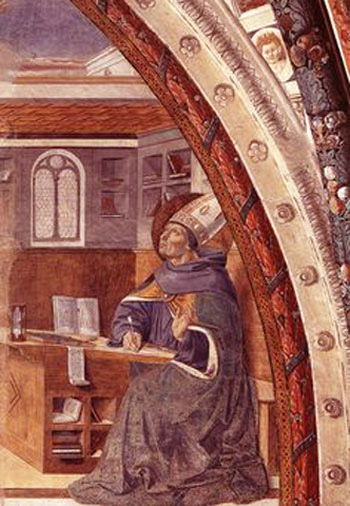 St. Augustine reported that extraordinary colloquium and it became one of the most famous excerpts of his Confessions (Book IX).
St. Augustine reported that extraordinary colloquium and it became one of the most famous excerpts of his Confessions (Book IX).
A few days later St. Monica would die while they were still in the city of Ostia. Her mission was accomplished on earth and Our Lord called her to Heaven to enjoy the award she had merited.
Thus, the last episode of her life was the joy of having that colloquium with her son, which was a harbinger, a pre-taste, of the Beatific Vision. Should any one of us pass through Ostia, it would be worthwhile to see whether that inn still exists.
I brought the narration of this colloquium to read here because it is a famous page and it may open our horizons for the grand portents of hagiography and the Catholic doctrine. The text is taken directly from the Confessions (Portuguese edition).
The day was now approaching whereon she was depart this life, which day Thou knewest well and we knew not…
These interpolations of St. Augustine speaking directly to God are magnificent. I suggest that you read the Soliloquies by St. Augustine, which are stupendous in this regard.
… It came to pass, as I believe, according to the dispositions of Thy secret designs, that we found ourselves alone, she and I, leaning against a certain window, which looked into the garden of the house where we then stayed. It was in Ostia, at the mouth of the Tiber, where, removed from the noise of men, we were recovering our strength after the fatigues of a long journey before embarking on the voyage.
We were discoursing there alone, sweetly, forgetting those things that are behind and opening our horizons to the things that are ahead. In the presence of the Truth, which Thou art, we were enquiring between ourselves what the eternal life of the saints would be, which eye has not seen, nor ear heard, not hath it entered into the heart of man.
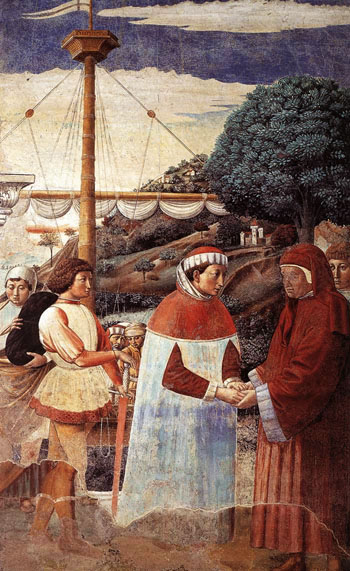 Consider this beautiful scene: Two Saints wondering about what the eternal life of the saints would be like. And the joy of St. Monica, knowning that long lost son of hers now was moved by fiery desires contemplating Heaven. It is a marvelous thing!
Consider this beautiful scene: Two Saints wondering about what the eternal life of the saints would be like. And the joy of St. Monica, knowning that long lost son of hers now was moved by fiery desires contemplating Heaven. It is a marvelous thing!
Yes, the lips of our hearts were eagerly opened for the celestial stream of Thy fountain, the fountain of Life, which is in Thee, so that, satiated according to our capacity, we might thus in some sort think about such a transcendent subject.
I call your attention for the marvelous expression the lips of our hearts. It means that through those lips the heart drinks, through them the heart sips. These lips were opened to receive from God what we can receive in this earthly life regarding the joys of Heaven.
The conversation walked along until it reached that point, the very highest delights of the corporal senses and the greatest and brightest of material splendors are not worthy of comparison with the happiness of that life, not even of mention. Elevating ourselves in a most ardent affection toward that happiness, we by degrees pass through all corporal things, up to the very skies whence sun and moon and stars shine upon the earth.
It is a true quest for the Absolute. (1) They began by considering the things of this earth that delighted the senses, for they were in the decadent Roman Empire in which there were fabulous fortunes and persons were able to delight the senses in a measure of which you have no idea. Then, the first comparison is to consider celestial happiness with the happiness of those men who were considered happy in the Roman Empire. Their conclusion: All this on earth is nothing.
Then, they started to ask: What is true happiness? And they started to analyze the skies, to imagine, based on the material and visible skies above them, how the actual celestial paradise would be and what would be the glory of the Beatific Vision that one enjoys in it.
This is how he summarizes their conversation. He continues:
Yea, we soared still higher in spirit by meditating, discoursing and admiring Thy works. We transcended the realm of our souls to arrive at that region of inexhaustible abundance, where Thou eternally feed Israel with the pasture of truth. There life is the Wisdom by Whom all things were created – everything that has existed and that shall come to exist – without the need of It creating Itself, for It exists as It has always been and as It will always be. Rather, neither “has been” nor “will be” exists in It, for It simply “is” eternal.
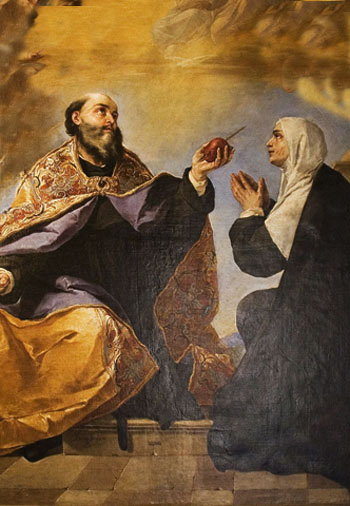 That is, after they have considered all material things, they started to consider the soul as a spiritual element in order to discover something of the beauty and perfection of God. After considering the soul, they reached the conclusion that, at the apex of everything, was the Eternal and Uncreated Wisdom. This Eternal Wisdom has no past, present or future. It was on this wise and supreme consideration that their spirits stopped to contemplate.
That is, after they have considered all material things, they started to consider the soul as a spiritual element in order to discover something of the beauty and perfection of God. After considering the soul, they reached the conclusion that, at the apex of everything, was the Eternal and Uncreated Wisdom. This Eternal Wisdom has no past, present or future. It was on this wise and supreme consideration that their spirits stopped to contemplate.
And while we so discoursed, longing for the Wisdom…
That is, seeking to know God as Wisdom, as the end and explanation of everything. You see how this is different from the “white heresy” contemplation.
…we touched upon It momentarily in one complete glimpse of our hearts.
They entered into ecstasy. While they conversed about these things led by the grace of God, at a certain moment the Eternal Wisdom revealed Itself to them and they had a mystical phenomenon by which they saw God.
You see that he presents it as something natural: they were two Saints whose conversation was a prayer. This prayer went ascending in flight orderly and when it reached its apex, then, God Our Lord appeared to them to let them know Him as Wisdom. Everything happened with simplicity, in a window of an Ostia's inn…
We sighed and left fixed there “the first fruits of our spirits.”
The better part of them stayed in that vision, it did not return to the earth.
We returned to the vain expressions of our lips, where the spoken word has beginning and end. How could it, O my God, be compared with Thy Word, which subsists in Itself, never becoming old and making all things new?
Here is an insinuation that God spoke a word to them. Naturally it was the Divine Word. If they were to continue to talk after God spoke to them that word about His Wisdom, it would be like babbling. The vision ended and their words seemed empty things in comparison to that which God had revealed about Himself.
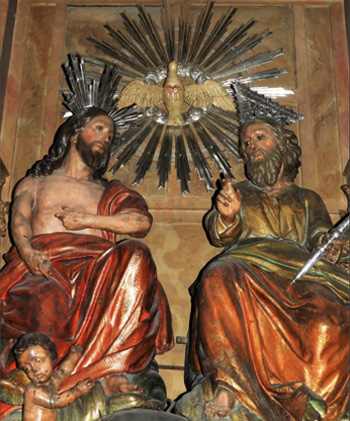 St. Augustine then goes on to try to explain the Word that they received:
St. Augustine then goes on to try to explain the Word that they received:
We said: let us suppose a soul where the rebellion of the flesh, the vain imaginations of the earth, water, air and sky were hushed and silenced.
Yea, let us suppose that the soul be hushed to itself and goes beyond itself not even thinking about itself; a soul in which all dreams and imaginary revelations, all human words, all signs, ultimately everything that exists only transitorily are also hushed and speechless.
Let us imagine that in that same soul a complete silence exists, and that if any still could hear, all beings would say to it: “We created not ourselves, but the One Who remains eternally made us.” If then having uttered this, these beings should be silent, since they had already roused their ears to the One Who made them. Let us suppose then that only He speaks, not through those creatures, but directly, so that we may hear His Word, not pronounced by any tongue of flesh nor the voice of an Angel, nor the rumble of thunder, nor by enigmatic metaphors, but by His very Self.
Let us suppose that we heard the One Whom we love in these creatures but without their mediation, such as we just experienced, reaching in one flight of thought the Eternal Wisdom, which remains immutable in every being.
He imagines a soul that no longer cogitates on anything created, that is able to abstract itself from everything and suddenly hears one word from God transmitting something about Himself.
Imagine, then, if this contemplation were to continue and if all other visions of a different order were to cease, if only this one were to rapture the soul and absorb it so that life might be forever like this one intuitive glance – the Beatific Vision that we long for – would this not be the realization of the “enter into the enjoyment of thy Lord”? And when shall this happen? Will it be when we shall all rise again? But then shall we not be all transformed?
He affirms that if a soul could stay eternally in that single glimpse it would already possess an ineffable and extraordinary pleasure.
While we spoke these things, although not in this way and with these same words, Thou well knowest, O Lord, how the world and all of its pleasures became contemptible to us on that day when we thus conversed.
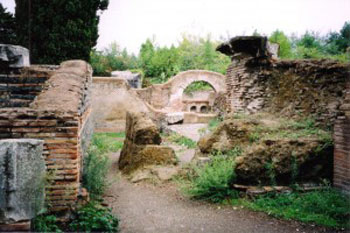 My mother yet added: “My son, for my own part, nothing more gives me delight in this life. I do not know what I still do here, or why I am yet here, since the hopes of this world are already faded. One thing there was for which I desired to linger for a while in this life, that I might see you a Catholic before I died. My God hath superabundantly conceded me this grace, since I see that you already despise earthly happiness to serve the Lord. What then have I to do here?”
My mother yet added: “My son, for my own part, nothing more gives me delight in this life. I do not know what I still do here, or why I am yet here, since the hopes of this world are already faded. One thing there was for which I desired to linger for a while in this life, that I might see you a Catholic before I died. My God hath superabundantly conceded me this grace, since I see that you already despise earthly happiness to serve the Lord. What then have I to do here?”
Days later she died.
In this vision St. Monica had a presage of her death; she understood that she had nothing left to do here on this earth...
Now, let us consider the difference between the great St. Monica and a sentimental mother. The latter would say: “Now that my son has converted, life starts for me! I will go to listen to his sermons and see his works. I will accompany him to have an enjoyable life in his priestly or episcopal house, admiring his virtue and his talent, which I have generated for the natural life, and be happy knowing that through my prayers I saved him from eternal death so that he might become a great saint. Now, after all those tears and prayers, the life of joy and satisfaction will begin for me!”
St. Monica did not want to have her son for any such superficial reasons. She wanted him for God. When she felt that St. Augustine was in the hands of God, she no longer felt the need to remain here to see him serving God. And so, some days later she passed away.
She was a great Saint whose last episode of her life was narrated by a great Saint, her son.
Here we see what the life of a Saint is when it is not described by a white heresy chronicler.
You see how many things this narration has in common with the doctrine of the Quest for the Absolute and related themes with which we have recently dealt.

The Saint of the Day features highlights from the lives of saints based on comments made by the late Prof. Plinio Corrêa de Oliveira. Following the example of St. John Bosco who used to make similar talks for the boys of his College, each evening it was Prof. Plinio’s custom to make a short commentary on the lives of the next day’s saint in a meeting for youth in order to encourage them in the practice of virtue and love for the Catholic Church. TIA thought that its readers could profit from these valuable commentaries.
The texts of both the biographical data and the comments come from personal notes taken by Atila S. Guimarães from 1964 to 1995. Given the fact that the source is a personal notebook, it is possible that at times the biographic notes transcribed here will not rigorously follow the original text read by Prof. Plinio. The commentaries have also been adapted and translated for TIA’s site.
In his Confessions St. Augustine has an especially magnificent text in which he describes the last conversation he had with St. Monica in the city of Ostia. It is called the Colloquium of Ostia.
The context is this: The mother of St. Augustine, St. Monica (331-387) spent almost 30 years weeping and asking God for the conversion of her son. It seemed that the more she prayed, the more futile his conversion seemed. Finally it reached the point that, after pursuing one delusion after another, St. Augustine ended by eating the husks of the swine and began the process of conversion, which made him the great Doctor of the Church that he became.
After his conversion, St. Augustine and St. Monica decided to return to Carthage in North Africa to dwell there. The ship should leave from Ostia. So, they travel to the port of Ostia, not far from Rome, which at that time had some importance. From there they would go to Africa.
They were in an inn in Ostia looking out of a window and started to talk about God and the things of Heaven when both entered into an ecstasy.

St. Augustine writing his Confessions
A few days later St. Monica would die while they were still in the city of Ostia. Her mission was accomplished on earth and Our Lord called her to Heaven to enjoy the award she had merited.
Thus, the last episode of her life was the joy of having that colloquium with her son, which was a harbinger, a pre-taste, of the Beatific Vision. Should any one of us pass through Ostia, it would be worthwhile to see whether that inn still exists.
I brought the narration of this colloquium to read here because it is a famous page and it may open our horizons for the grand portents of hagiography and the Catholic doctrine. The text is taken directly from the Confessions (Portuguese edition).
The day was now approaching whereon she was depart this life, which day Thou knewest well and we knew not…
These interpolations of St. Augustine speaking directly to God are magnificent. I suggest that you read the Soliloquies by St. Augustine, which are stupendous in this regard.
… It came to pass, as I believe, according to the dispositions of Thy secret designs, that we found ourselves alone, she and I, leaning against a certain window, which looked into the garden of the house where we then stayed. It was in Ostia, at the mouth of the Tiber, where, removed from the noise of men, we were recovering our strength after the fatigues of a long journey before embarking on the voyage.
We were discoursing there alone, sweetly, forgetting those things that are behind and opening our horizons to the things that are ahead. In the presence of the Truth, which Thou art, we were enquiring between ourselves what the eternal life of the saints would be, which eye has not seen, nor ear heard, not hath it entered into the heart of man.

St. Augustine & St. Monica disembark at Ostia
Yes, the lips of our hearts were eagerly opened for the celestial stream of Thy fountain, the fountain of Life, which is in Thee, so that, satiated according to our capacity, we might thus in some sort think about such a transcendent subject.
I call your attention for the marvelous expression the lips of our hearts. It means that through those lips the heart drinks, through them the heart sips. These lips were opened to receive from God what we can receive in this earthly life regarding the joys of Heaven.
The conversation walked along until it reached that point, the very highest delights of the corporal senses and the greatest and brightest of material splendors are not worthy of comparison with the happiness of that life, not even of mention. Elevating ourselves in a most ardent affection toward that happiness, we by degrees pass through all corporal things, up to the very skies whence sun and moon and stars shine upon the earth.
It is a true quest for the Absolute. (1) They began by considering the things of this earth that delighted the senses, for they were in the decadent Roman Empire in which there were fabulous fortunes and persons were able to delight the senses in a measure of which you have no idea. Then, the first comparison is to consider celestial happiness with the happiness of those men who were considered happy in the Roman Empire. Their conclusion: All this on earth is nothing.
Then, they started to ask: What is true happiness? And they started to analyze the skies, to imagine, based on the material and visible skies above them, how the actual celestial paradise would be and what would be the glory of the Beatific Vision that one enjoys in it.
This is how he summarizes their conversation. He continues:
Yea, we soared still higher in spirit by meditating, discoursing and admiring Thy works. We transcended the realm of our souls to arrive at that region of inexhaustible abundance, where Thou eternally feed Israel with the pasture of truth. There life is the Wisdom by Whom all things were created – everything that has existed and that shall come to exist – without the need of It creating Itself, for It exists as It has always been and as It will always be. Rather, neither “has been” nor “will be” exists in It, for It simply “is” eternal.

The colloquium of Ostia
And while we so discoursed, longing for the Wisdom…
That is, seeking to know God as Wisdom, as the end and explanation of everything. You see how this is different from the “white heresy” contemplation.
…we touched upon It momentarily in one complete glimpse of our hearts.
They entered into ecstasy. While they conversed about these things led by the grace of God, at a certain moment the Eternal Wisdom revealed Itself to them and they had a mystical phenomenon by which they saw God.
You see that he presents it as something natural: they were two Saints whose conversation was a prayer. This prayer went ascending in flight orderly and when it reached its apex, then, God Our Lord appeared to them to let them know Him as Wisdom. Everything happened with simplicity, in a window of an Ostia's inn…
We sighed and left fixed there “the first fruits of our spirits.”
The better part of them stayed in that vision, it did not return to the earth.
We returned to the vain expressions of our lips, where the spoken word has beginning and end. How could it, O my God, be compared with Thy Word, which subsists in Itself, never becoming old and making all things new?
Here is an insinuation that God spoke a word to them. Naturally it was the Divine Word. If they were to continue to talk after God spoke to them that word about His Wisdom, it would be like babbling. The vision ended and their words seemed empty things in comparison to that which God had revealed about Himself.

St. Augustine & St. Monica received a glimpse of the Eternal Wisdom
We said: let us suppose a soul where the rebellion of the flesh, the vain imaginations of the earth, water, air and sky were hushed and silenced.
Yea, let us suppose that the soul be hushed to itself and goes beyond itself not even thinking about itself; a soul in which all dreams and imaginary revelations, all human words, all signs, ultimately everything that exists only transitorily are also hushed and speechless.
Let us imagine that in that same soul a complete silence exists, and that if any still could hear, all beings would say to it: “We created not ourselves, but the One Who remains eternally made us.” If then having uttered this, these beings should be silent, since they had already roused their ears to the One Who made them. Let us suppose then that only He speaks, not through those creatures, but directly, so that we may hear His Word, not pronounced by any tongue of flesh nor the voice of an Angel, nor the rumble of thunder, nor by enigmatic metaphors, but by His very Self.
Let us suppose that we heard the One Whom we love in these creatures but without their mediation, such as we just experienced, reaching in one flight of thought the Eternal Wisdom, which remains immutable in every being.
He imagines a soul that no longer cogitates on anything created, that is able to abstract itself from everything and suddenly hears one word from God transmitting something about Himself.
Imagine, then, if this contemplation were to continue and if all other visions of a different order were to cease, if only this one were to rapture the soul and absorb it so that life might be forever like this one intuitive glance – the Beatific Vision that we long for – would this not be the realization of the “enter into the enjoyment of thy Lord”? And when shall this happen? Will it be when we shall all rise again? But then shall we not be all transformed?
He affirms that if a soul could stay eternally in that single glimpse it would already possess an ineffable and extraordinary pleasure.
While we spoke these things, although not in this way and with these same words, Thou well knowest, O Lord, how the world and all of its pleasures became contemptible to us on that day when we thus conversed.

Ruins of Ostia today
Days later she died.
In this vision St. Monica had a presage of her death; she understood that she had nothing left to do here on this earth...
Now, let us consider the difference between the great St. Monica and a sentimental mother. The latter would say: “Now that my son has converted, life starts for me! I will go to listen to his sermons and see his works. I will accompany him to have an enjoyable life in his priestly or episcopal house, admiring his virtue and his talent, which I have generated for the natural life, and be happy knowing that through my prayers I saved him from eternal death so that he might become a great saint. Now, after all those tears and prayers, the life of joy and satisfaction will begin for me!”
St. Monica did not want to have her son for any such superficial reasons. She wanted him for God. When she felt that St. Augustine was in the hands of God, she no longer felt the need to remain here to see him serving God. And so, some days later she passed away.
She was a great Saint whose last episode of her life was narrated by a great Saint, her son.
Here we see what the life of a Saint is when it is not described by a white heresy chronicler.
You see how many things this narration has in common with the doctrine of the Quest for the Absolute and related themes with which we have recently dealt.
- See the doctrine of the Quest of the Absolute in The Human Process, part I, chapter III and in this series of articles on our site.
 | |
|
|
The texts of both the biographical data and the comments come from personal notes taken by Atila S. Guimarães from 1964 to 1995. Given the fact that the source is a personal notebook, it is possible that at times the biographic notes transcribed here will not rigorously follow the original text read by Prof. Plinio. The commentaries have also been adapted and translated for TIA’s site.